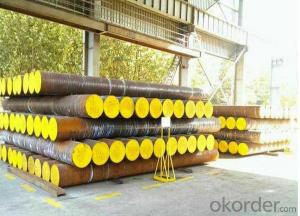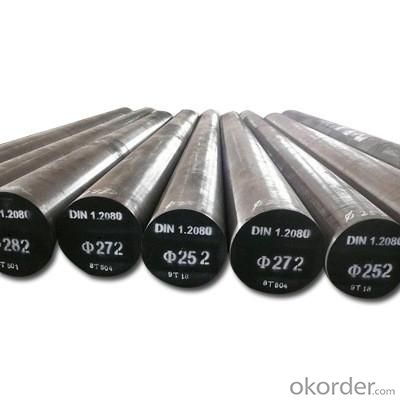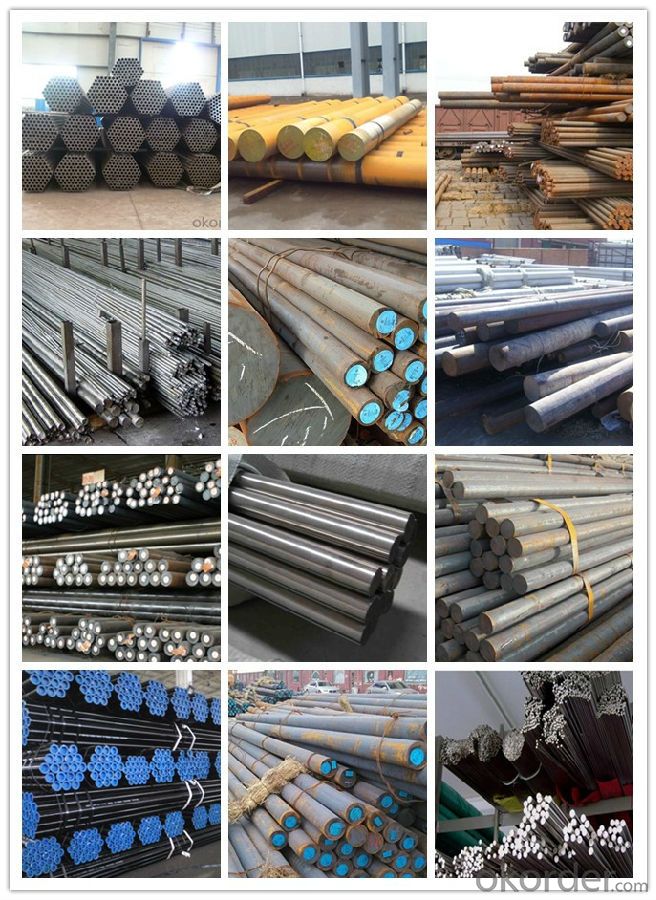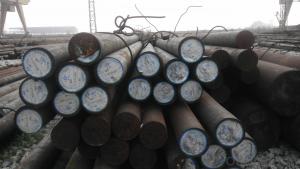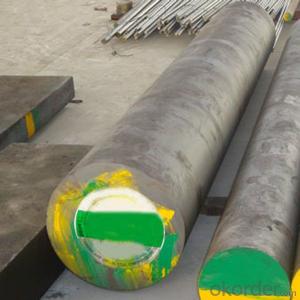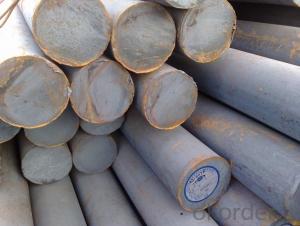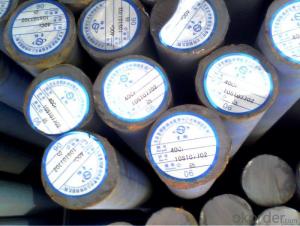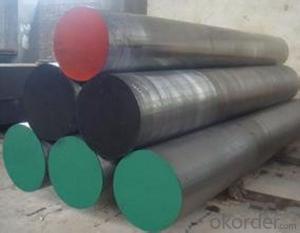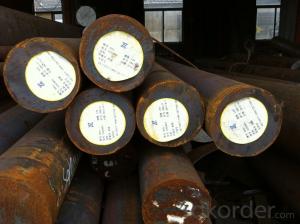Special Steel 42CrMo Round Bar Steel SCM440
- Loading Port:
- China main port
- Payment Terms:
- TT OR LC
- Min Order Qty:
- 30 m.t.
- Supply Capability:
- 10000 m.t./month
OKorder Service Pledge
OKorder Financial Service
You Might Also Like
Specification
| 1.Specification | ||||||||
| Round bar | Diameter(mm) | Length (mm) | ||||||
| 20~600 | 3000~9000 | |||||||
| Plate | Thickness(mm) | Width (mm) | Length (mm) | |||||
| Max:800 | Max:2200 | Max:9000 | ||||||
| *Specification can be customized for sure. | ||||||||
| 2.Chemical Compositons | ||||||||
| Grade | C | Si | Mn | P | S | Cr | Mo | Ni |
| SCM440 | 0.38~0.45 | 0.17~0.37 | 0.50~0.8 | ≤0.035 | ≤0.035 | 0.9~1.2 | 0.15-0.25 | ≤0.3 |
| 4140 | 0.40~0.45 | 0.15~0.35 | 0.75~1.0 | ≤0.035 | ≤0.040 | 0.8~1.1 | 0.15-0.25 | - |
| SCM415 | 0.38~0.43 | 0.15~0.35 | 0.60~0.9 | ≤0.030 | ≤0.030 | 0.9~1.2 | 0.15-0.30 | ≤0.25 |
| 1.7225 | 0.38~0.45 | ≤0.40 | 0.60~0.9 | ≤0.025 | ≤0.035 | 0.9~1.2 | 0.15-0.30 | |
| 3.Delivery Conditions | ||||||||
| Hot forged +Rough machined (black surface after Q/T)+ Turned (optional) | ||||||||
| 4.Typical Applications | ||||||||
| a.Statically and dynamically stressed components for vehicles | ||||||||
| b.Parts of larger cross-sections, crankshafts, gears | ||||||||
| c.Gears, stem assemblies, | ||||||||
| d.Pump shafts and tool holders | ||||||||
Product show
Workshop show
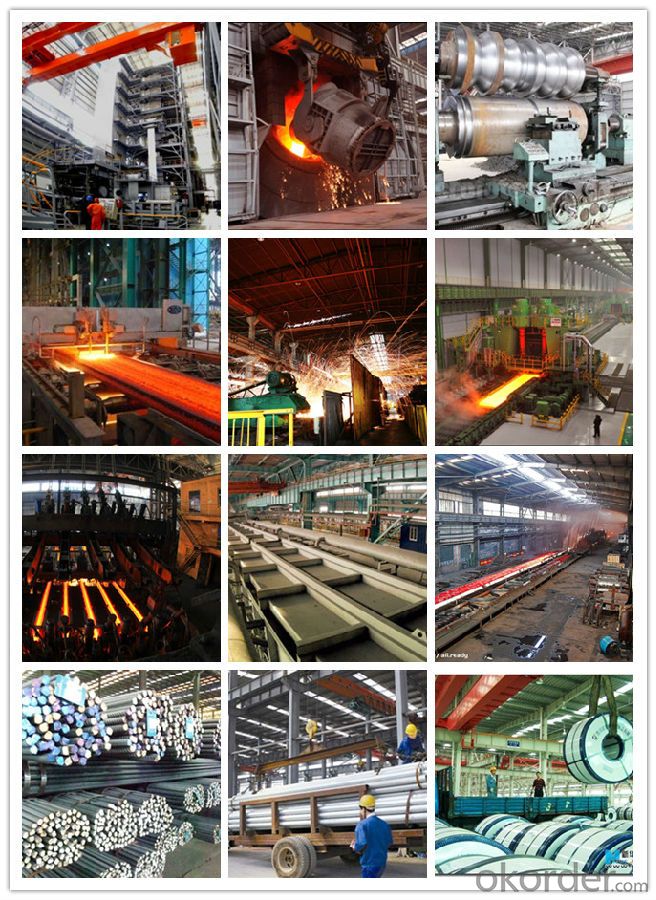
Shipping
1. FedEx/DHL/UPS/TNT for samples, Door-to-Door;
2. By Air or by Sea for batch goods, for FCL; Airport/ Port receiving;
3. Customers specifying freight forwarders or negotiable shipping methods!
Delivery Time: 3-7 days for samples; 5-25 days for batch goods.
Payment Terms
1.Payment: T/T, L/C, Western Union, MoneyGram,PayPal; 30% deposits; 70% balance before delivery.
2.MOQ: 1pcs
3.Warranty : 3 years
4.Package Informations: 1) EXPORT, In 20 feet (GW 25 ton) or 40 feet Container (GW 25 ton)
2)as customer's requirement
Why choose us?
(1) The leading exporter in China special steel industry.
(2) Large stocks for various sizes, fast delivery date.
(3) Good business relationship with China famous factories.
(4) More than 7 years steel exporting experience.
(5) Good after-sales service guarantee.
- Q: What are the main factors affecting the wear resistance of special steel?
- The main factors affecting the wear resistance of special steel include the composition of the steel, the hardness and microstructure of the steel, the presence of carbides or other hardening elements, the surface finish and treatment of the steel, and the operating conditions in which the steel is used.
- Q: What are the main alloying elements in special steel?
- The specific type or grade of special steel can determine the main alloying elements present. Chromium, nickel, molybdenum, vanadium, tungsten, and cobalt are common alloying elements in special steel. These elements are incorporated into the steel to improve its properties, including corrosion resistance, strength, hardness, and heat resistance. Each alloying element has a distinct impact on the steel, enabling the development of specialized steel grades for diverse applications in industries like aerospace, automotive, oil and gas, and construction.
- Q: What are the heat treatment processes used for special steel?
- Some of the heat treatment processes used for special steel include annealing, quenching, tempering, and hardening. Annealing involves heating the steel to a specific temperature and slowly cooling it to improve its ductility and reduce internal stress. Quenching is a rapid cooling process that hardens the steel by quickly cooling it from a high temperature, creating a tough and wear-resistant material. Tempering is a process that follows quenching, where the steel is reheated to a lower temperature to reduce brittleness and improve toughness. Hardening involves heating the steel to a high temperature and then rapidly cooling it to increase its hardness and strength. These heat treatment processes are used to enhance the properties and performance of special steel for various applications.
- Q: Can special steel be used in the railway industry?
- Yes, special steel can be and is commonly used in the railway industry. Special steel alloys such as manganese steel, stainless steel, and wear-resistant steel are often utilized in the manufacturing of railway tracks, wheels, axles, and other components. These special steel materials offer enhanced strength, durability, and resistance to corrosion and wear, making them ideal for withstanding the heavy loads, frequent use, and harsh environmental conditions experienced in the railway industry.
- Q: What are the different methods of machining special steel?
- There are several different methods of machining special steel, each with its own advantages and applications. Some of the most common methods include: 1. Turning: Turning is a machining process that involves rotating a workpiece while a cutting tool removes material from the surface. This method is typically used to create cylindrical shapes and can produce high-quality finishes. 2. Milling: Milling is a versatile machining method that uses rotary cutters to remove material from a workpiece. It can be used to create complex shapes and contours, and is often employed in the production of special steel components. 3. Drilling: Drilling is a machining process that involves creating holes in a workpiece using a rotating cutting tool. It can be used to create both through holes and blind holes in special steel, and is commonly used in various industries. 4. Grinding: Grinding is a precision machining method that uses an abrasive wheel to remove material from a workpiece's surface. It is often used to achieve tight tolerances and smooth finishes on special steel components. 5. Broaching: Broaching is a machining process that uses a sharp cutting tool with multiple teeth to remove material in a series of linear cuts. It is commonly used to create keyways, splines, and other intricate shapes in special steel. 6. Electrical Discharge Machining (EDM): EDM is a non-traditional machining method that uses electrical discharges to remove material from a workpiece. It is particularly useful for machining special steel with complex shapes or for creating small features. 7. Laser Cutting: Laser cutting utilizes a high-powered laser to cut through special steel with extreme precision. It is commonly used for intricate designs and can produce smooth edges without the need for subsequent processing. Each of these methods has its own advantages and limitations, and the choice of machining method depends on factors such as the desired outcome, the complexity of the part, and the properties of the special steel being machined.
- Q: What are the properties of spring steel?
- Spring steel is a type of high carbon steel that possesses excellent elasticity and resilience, making it ideal for applications requiring strong and flexible materials. It exhibits superior strength and hardness, along with good fatigue resistance, which allows it to withstand repeated bending or twisting without deforming or breaking. Moreover, spring steel is known for its high yield strength, allowing it to store and release energy efficiently, making it suitable for various spring applications such as suspension systems, mechanical springs, and tools.
- Q: How is carbon steel used in the manufacturing of pipes and tubes?
- Carbon steel is commonly used in the manufacturing of pipes and tubes due to its high strength and durability. It provides excellent resistance to corrosion and can withstand extreme temperatures and pressure. Additionally, carbon steel can be easily formed and welded, making it ideal for the fabrication process involved in producing pipes and tubes.
- Q: What are the main applications of special steel in the chemical industry?
- Special steel is extensively used in the chemical industry for various applications. Some of the main applications include the manufacturing of storage tanks, pipelines, and equipment that require resistance to corrosion, high temperatures, and pressure. Special steel also finds use in the production of catalysts, which are vital for many chemical processes. Additionally, it is employed in the construction of reactors, heat exchangers, and other critical components that require exceptional durability and reliability in harsh chemical environments.
- Q: What are the different wear-resistant grades of special steel?
- In the market, one can find various grades of special steel that are resistant to wear. Each grade has its own unique properties and applications. Some commonly used grades include: 1. D2 Steel: This grade is known for its high resistance to wear and its exceptional toughness. It is often utilized in the manufacturing of cutting tools, punches, and dies. 2. M2 Steel: M2 steel is a type of high-speed steel that exhibits remarkable resistance to wear and heat. It is commonly employed in the production of drill bits, milling cutters, and other tools that require high hardness and wear resistance. 3. A2 Steel: A2 steel is a versatile grade known for its excellent resistance to wear and toughness. It is frequently utilized in the manufacturing of cold work tools, such as blanking dies and gauges. 4. O1 Steel: O1 steel is an oil-hardening tool steel that possesses good wear resistance and dimensional stability. It is commonly used in the production of blades, punches, and other cutting tools. 5. S7 Steel: S7 steel is a grade that is highly resistant to shock and wear. It is often employed in the manufacturing of chisels, shear blades, and other tools that require resistance to impact and wear. 6. AR400 Steel: AR400 steel is a specific type of abrasion-resistant steel that has a hardness of approximately 400 Brinell. It is frequently utilized in heavy-duty applications such as mining equipment, bulldozer blades, and dump truck bodies. These examples merely scratch the surface of the various wear-resistant grades of special steel available in the market. The choice of grade depends on the specific requirements of the application, including the type and intensity of wear, operating conditions, and desired hardness. Seeking advice from a steel supplier or expert can aid in selecting the most suitable grade for a particular application.
- Q: How does special steel perform in high-wear applications?
- Special steel is specifically designed to withstand high-wear applications due to its exceptional hardness, toughness, and resistance to deformation. It exhibits superior performance by maintaining its shape, strength, and durability even under extreme conditions such as friction, abrasion, and impact. This makes it an ideal choice for industries where wear resistance is crucial, such as automotive, construction, mining, and manufacturing.
Send your message to us
Special Steel 42CrMo Round Bar Steel SCM440
- Loading Port:
- China main port
- Payment Terms:
- TT OR LC
- Min Order Qty:
- 30 m.t.
- Supply Capability:
- 10000 m.t./month
OKorder Service Pledge
OKorder Financial Service
Similar products
Hot products
Hot Searches
Related keywords
